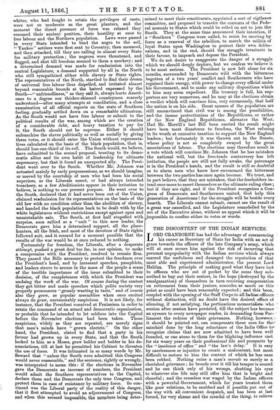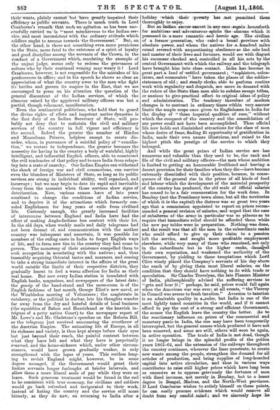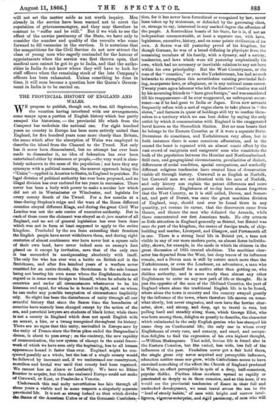THE DISCONTENT OF THE INDIAN SERVICES: L ORD CRANBORNE has had
the advantage of commencing his career as Secretary of State for India with an act of grace towards the officers of the late Company's army, which will at once secure him against the risk of incurring that personal unpopularity with the Indian services which always marred the usefulness and damaged the reputation of that most able and experienced administrator, the present Lord Halifax. The principle of making good what they have lost to officers who are out of pocket by the sums they sub- scribed to buy out their seniors, in the hope (destroyed by the amalgamation) of themselves in turn receiving compensation on retirement from their juniors, concedes as much on this point as could have been reasonably expected ; and this boon, coupled with the opening of the Staff Corps to all Indian offloers without distinction, will no doubt have the desired: effect of silencing, if not satisfying, the pertinacious memorialists, who ' session after session have persisted, till the subject has become, an eyesore to every newspaper reader, in demanding from Par. - liament the redress of their grievances. Nothing, however,: it should be pointed out, can compensate these men for thee mischief done by the long reluctance of the India Office tee recognize claims that are now admitted to have been well founded, or can atone to them for the blighting influence cast for six weary years on their professional life and prospects by the " insolence of office " and " the law's delay." It is easy by carelessness or injustice to create a malcontent, but most difficult to restore to him the content of which he has once been robbed. Nothing ruins a man's morale so surely as a cherished grievance ; he broods over it till his temper is soured and he can think only of his wrongs, shutting his eyes to whatever else life may still offer him that is bright and cheerful ; and the ceaseless war waged by the Indian officers with a powerful Government, which for years treated them like poor relations, to be snubbed and if possible put out of the way with all convenient despatch, and has been at last forced, for very shame and the sc,audal of the thing, to relieve their wants, plainly cannot but have greatly impaired their efficiency as public servants. There is 'soh truth in Lord Crafiboree's rethafk- thit each Ian agitation as has been suc- cessfully allied On'is t9nost mischievous to the Indian-ser- vice, and most inconsistent with the ordinary attitude 'which solfflers might to assume towards the Government." But, on the other hind, is there not something even more pernicious to the State, more fatal to the existence of a spirit of loyalty and good discipline among the servants of the Crown, in the conduct of a Government which, emulating the example of the unjust -judge, seems only to redress the grievances of suitors who by their continual 'coining may weary it ? Lord Cranborne, however, is not responsible for the mistakes -of his predecessors in office; and in his speech he shows so clear an appreciation of what the country owes' to the men who fight its battles and govern its empire in the East, that we are encouraged to press on his attention the, question of the general discontent of the Indian • services, of which the clamour raised by the aggrieved military officers was but a psrtial, though vehement, manifestation.
"Even the sentimental politicians, who hold that to guard the divine rights of effete and impotent native'dynasties is the first duty of an Indian Secretary of State, will pro- bably not deny that to maintain the civil and military services of the country in full vigour and efficiency is the second. Indeed the greater the number of Hindoo and Mussulman Princes, helpless except to create -dis- order, whom, in pursuance of • a suicidal policy of " concilia- tion," we restore to independence, the greater becomes the necessity for having in the country a body of watchful, highly intelligent, and influential English officers, able to counteract the evil tendencies of that policy and tosave India from relaps- ingitto a state of anarchy. Our Indian Empire can withstand the shock of foreign war and civil • commotions, can survive even the blunders of Ministers of State,- so long as its public services- are strong in individual ability, well organized, and ineorrupt ; but we may begin to date its rapid-and inevitable decay from the moment when those services show signs of deterioration. Now, various eauses have of late years combined to change the conditions of Indian • service, and- to deprive it of the attractions- which formerly con- soled Englishmen for long years of -exile from civilized
life. Curiously enough, the greatly increased facilities of intercourse between • England and India have ' had the effect of making Anglo-Indians less content with their lot. In the old days, when weekly mails and daily telegrams had not been dreamt of, and communication with the mother country was infrequent and uncertain, it was possible for members of the Piling 'caste in India to forget English ways of life, and to form new ties in the country they had come to govern. The monotony of their existence compelled them to seek - occupation in associating with the natives ; and, thus insensibly acquiring Oriental tastes and manners, and ceasing to take a strong immediate interest in the affairs of the great world outside' the limits of their respective districts, they gradually learnt to feel a warm affection for India as their real home. But now every Indian station is inundated with English books, magazines, and -newspapers of the latest date; the gossip of the band-stand and the mess-room is of the English fashions of last month, George Eliot's -new -novel, or the Wimbledon meeting of Volunteers ; the magistrate in cutcherry, or the political in durbar, lets his thoughts wander far away from the dry and hateful details of local business (the squabbles of Baboo and Hurrichund or the knavish in- trigues of a petty native Court) to the newspaper report of Mr. Lowe's and Mr. Gladstone's speeches on the Reform Bill, or the telegram just received announcing the overthrow of the Austrian Empire. The animating life of Europe, in all its richness and variety, is thus kept always before their eyes but just beyond their reach, the painful contrast between what they have left and what they have is perpetually renewed, and the home-sickness which, under other circum- stances, would have grown gradually weaker, is only strengthened with the lapse of years. This restless long- ing to revisit England might, however, be in some degree assuaged, if the Government would grant their Indian servants longer furloughs at briefer intervals, and allow them a more liberal scale of pay while they were on leave. Such generous treatment would be found in the end to be consistent with true economy, for civilians and soldiers would go back refreshed and invigorated to their work, instead of hating the country and the service still more bitterly, as they do now, on returning to India after a
holiday 'which -their ;poverty has ;not permitted them thoroughly to enjoy.
.But an Indian careernannet in any case -regain ,henceforth for ambitious -and adventurous-spirits the charms which it possessed in a more romantic and heroic age. The civilian of -a former: generation, who - r*aled r a broad -province -with absolute power, and whom the natives for ,a _;hundred miles round revered- with unquestioning obedience■ as the sole lord.
and :master of their lives and fortunes, would see with-disgust his successor checked and controlled in allthis acts by the central Government-with which-the railwajeand the telegraph have brought him- into close • contact. India - has ;become in great part.a land of .settled government ; ‘isoplaisters,'ealca- lators, and economists " have taken the places of the- soldier- statesmen of old ; and steady clerks, able to perform routine work with regularity and despatch, are more in demand -with the rulers of the-,State than men able to subdue savage tribes, or anxious to giveepractical effect -to original ideas of, policy and administration. The tendency therefore of modern changes is to contract in ordinary times-within verynarrow limits the ample scope once given- to Englishmen 'in India for the display of " those imperial qualities Of race," -without which the conquest of,the country: and' the- consolidation of our power could•'not have been accomplished. Thus official life now holds out diminished attractions for the class of- men whose desire of fame; finding fit opportunity of gratification in India, made their own names illustrious, and raised -to the highest pithh :the prestige of the service . to which they belonged.
And • while the great -prizes of Indian 'service are less numerous and valuable than they used to' be, the rank' and file of the civiland -military officers—the men whose • ambition is limited to getting an honourable livelihood and • leaving .a decent provision for their families when they ffie—'nave become extremely- dissatisfied with their position, ,berause, in conse- quence of the general rise in the prices of all kinds of food and labour:which the development of the -material prosperity of the country= has produced, the old scale of Official salaries has ceased to be a fair' remuneration for the work done. In Bombay (notthe Presidency town: alone, but all the territories of which it it the tapital) the distress-was so great two years ago that a- commission appointed 'to- repeat an prices recom- mended a general revision of salaries,-and urged that the case of subalterns of' the army in partitular was so piteous as to require that immediate -relief - should be afforded them while the new •pay tables -were in preparation. Nothing was done, and the result was that all the men in the-subordinate rank; who could 'afford to give up their claim to a pension left the service, and sought more profitable employment elsewhere, while very-many of those who remained,, snot only in the subordinate but in the higher ranks, damaged their own reputation, and weakened the authority of the Government, by yielding to those temptations which Lofd Clive wisely placed the Company's servants of his day-above the reach of by giving them most liberal salaries, on the condition that they should have nothing to do with trade or speculation. Sir Charles Trevelyan, -the late Finance Minister of India, philosophically advised the suffering Services to " grin and bear it ; ' perhaps, he said, prices would fall again when the American war was over; at all events, " the Viceroy in Council was averse to fresh taxation." Aversion to taxation is an admirable quality in azuler, but India is one of the most lightly taxed countries in the -.world, and if it cannot afford to pay the -cost of a strong and 'efficient Government, the sooner the English leave the country the •better. As to the reactionary influence on prices of the commercial and monetary panic in India, the rise may have -been tempothrily interrupted, but the general causes which produced it have not been removed, and 'some are still, others will soon be again, in active operation. The trade of India:is not dead, though it no longer brings in the splendid -profits of the golden years 1861-64, and the extension of the railways throughout the country continues, wherever the lines •penetrate, to create new wants among the -;people, strengthen the demand for all articles of production, and bring supplies of long-hoarded capital into active circulation, and thus in various ways contributes to raise still higher prices which have long been so excessive as to oppress grievously the fortunes of men with fixed incomes, not merely in Bombay, but to a -lesser degree in Bengal, Madras, and -the North West provinces. If Lord Cranborne wishes to satisfy himself on these points, he can easily procure evidence which would remove all doubt from any candid _mind; And we sincerely hope he will not set the matter aside as not worth inquiry. Men already in the service have been warned not to covet the reputation of grievaneemongers, and they may therefore 'be content to " suffer and be still." But if we wish to see the effect of the unwise parsimony of the State, we have only to consider the number and quality of the recruits -who come forward to fill vacancies in the services. It is notorious that the•cempetitions for the-Civil Service do not now attract the class of young men who eagerly• contended for the honour of appointments when the service was first thrown open, that medical men cannot be got to go to India, and that the autho- rities in India do not know where they will have to look, for staff officers when the remaining stock of the late Company's officers has been exhausted. Unless something be done in time, it will soon become a questiou how the Queen's Govetn- meat in India,is to be carried on.
































 Previous page
Previous page